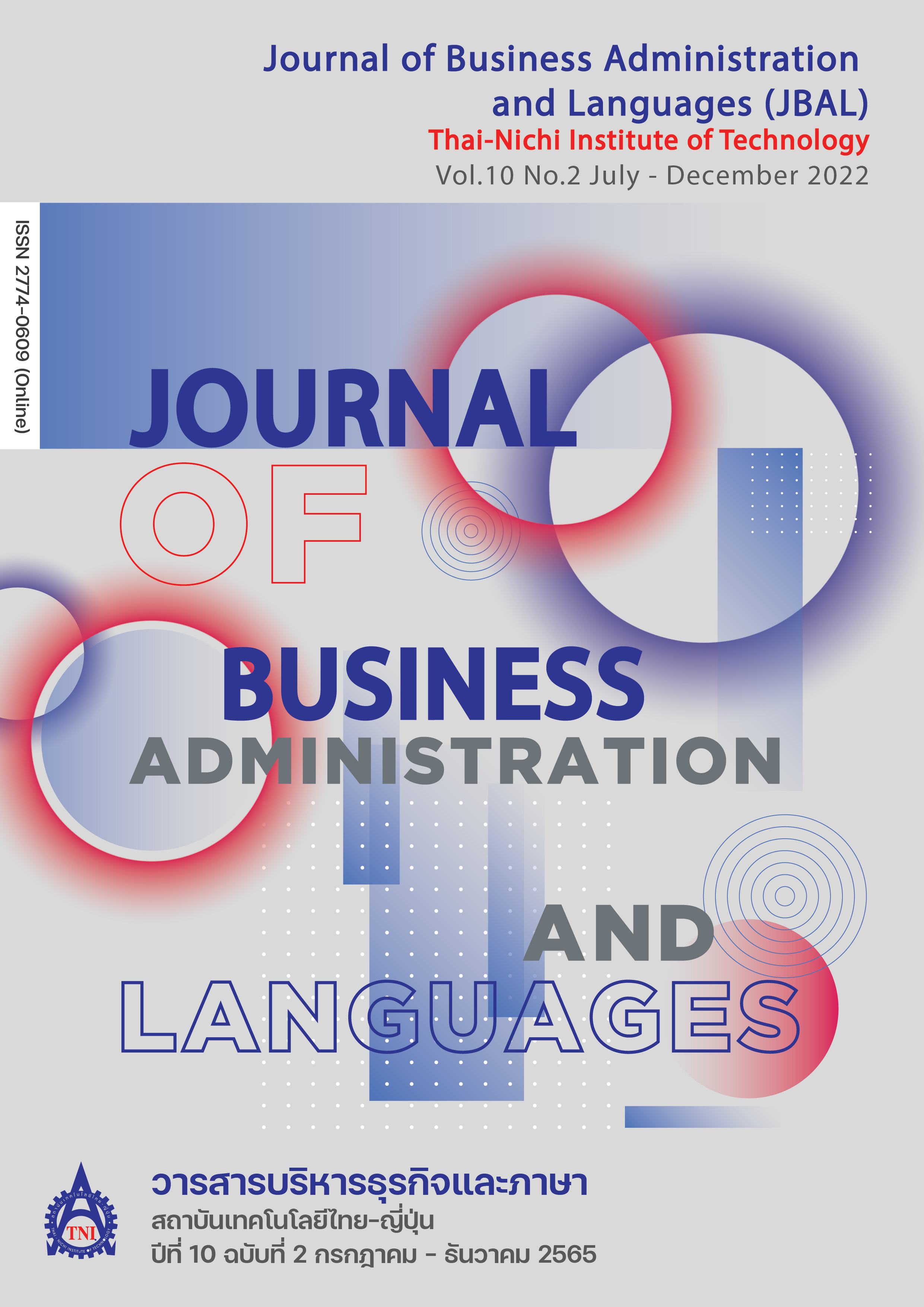Brand Image and Brand Equity of the Hokkaido Export Brand Affects the Decision to Purchase Products from the Hokkaido Region in Thailand
Main Article Content
Abstract
The objective of this study was to study the brand image and brand equity affecting the decision to purchase imported goods from the Hokkaido region in Thailand. Data were collected using a convenient random sampling method by distributing questionnaires in paper and online to 400 Thai consumers who buy imported products from the Hokkaido region. The statistics used for data analysis were frequency, mean, standard deviation, percentage, and multiple regression analysis.
The research results revealed that the brand equity in terms of perceived quality, and brand awareness and the brand image in terms of culture, attributes, and benefits affected purchasing decisions with a 57.0 percent predictive power with a statistically significant level of 0.01. On the other hands, the brand image in terms of value and personality and brand value in relation to the brand and the trademark aspect did not affect the purchase decision. Therefore, the Hokkaido Government Representative Office and the Hokkaido International Trade and Industry Promotion Association or related agencies should specify the strategies to increase consumer awareness, such as presenting the origins of products from various prefectures in the Hokkaido region for acquiring the Hokkaido export brand and also specify strategies to promote the Hokkaido export brand to make Thai consumers more familiar with the Hokkaido export brand for increasing circulation of imported products from the Hokkaido region in Thailand.
Article Details

This work is licensed under a Creative Commons Attribution-NonCommercial-NoDerivatives 4.0 International License.
Article Accepting Policy
The editorial board of Thai-Nichi Institute of Technology is pleased to receive articles from lecturers and experts in the fields of business administration, languages, engineering and technology written in Thai or English. The academic work submitted for publication must not be published in any other publication before and must not be under consideration of other journal submissions. Therefore, those interested in participating in the dissemination of work and knowledge can submit their article to the editorial board for further submission to the screening committee to consider publishing in the journal. The articles that can be published include solely research articles. Interested persons can prepare their articles by reviewing recommendations for article authors.
Copyright infringement is solely the responsibility of the author(s) of the article. Articles that have been published must be screened and reviewed for quality from qualified experts approved by the editorial board.
The text that appears within each article published in this research journal is a personal opinion of each author, nothing related to Thai-Nichi Institute of Technology, and other faculty members in the institution in any way. Responsibilities and accuracy for the content of each article are owned by each author. If there is any mistake, each author will be responsible for his/her own article(s).
The editorial board reserves the right not to bring any content, views or comments of articles in the Journal of Thai-Nichi Institute of Technology to publish before receiving permission from the authorized author(s) in writing. The published work is the copyright of the Journal of Thai-Nichi Institute of Technology.
References
Aaker, D. A. (1991). Managing Brand Equity: Capitalizing on the Value of a Brand Name. New York, NY: The Free.
Greene, M. (2009). Justifying Social Marketing Spending. Retrieved from https://vdocuments.net/justifying-social-marketing.html
Hair, J. F., Black, W. C., Babin, B. J. & Anderson, R. E. (2010). Multivariate Data Analysis (7th ed.). New Jersey, NJ: Pearson Prentice Hall.
Hokkaido Government Representative Office & Hokkaido International Trade and Industry Promotion Association. (2017). Hokkaido symbol mark for export. Retrieved from https://www.pref.hokkaido.lg.jp/fs/3/7/4/8/3/6/8/_/symbol_mark_leaflet_en_1.pdf
Kanlaya Vanichbuncha. (2013). Regression and Correlation Analysis (14th ed.). (in Thai). Bangkok, Thailand: CU Press.
Khairunnisa, E. I. & Genoveva, G. (2019). The influence of brand equity towards purchase decision (Case study of Korean cosmetics Innisfree in Jabodetabek). Journal Manajemen Bisnis Kompetensi, 14(1), 45–59.
Klive Wongveerasin. (2018). Japanese brand perception and buyer motivation that affect Bangkok consumer purchase decision (in Thai). (Master’s thesis). Thai-Nichi Institute of Technology, Bangkok, Thailand.
Kotler, P. (2003). Marketing Management (11th ed.). Upper Saddle River, NJ: Pearson Education International.
Kotler, P. (2017). Marketing 4.0: Moving from Traditional to Digital. Hoboken, NJ: John Wiley & Sons.
Ketwadee Marumura. (2020, December, 3). The expectation on word “Made in ...”, obstacles that business owners must overcome [Web log post]. Retrieved from https://www.krungsri.com/th/plearn-plearn/expectations-and-difficulties-of-made-in-tag
Naravit Chantawee. (2019). Image perception, brand equity, buying decisions of brand Mercedes Benz (in Thai). (Master’s thesis). Sripatum University Chonburi Campus, Chonburi, Thailand.
Pimpron Imsang. (2018). The influences of brand image and social value on consumer’s purchase intention of UNIQLO in Bangkok areas (in Thai). (Independent Study). Bangkok University, Pathum Thani, Thailand.
Prasetyo, E. T. & Purwantini S. (2017). An influence analysis of product quality, brand image, and price on the decision to buy Toshiba laptop (A study on students of economics Faculty of Semarang University). Economics and Business Solutions Journal, 1(2), 11–18.
Sirichai Pongwichai. (2013). Computer Statistical Data Analysis: Emphasis on Research. (in Thai). Bangkok, Thailand: CU Press.
Siwakhorn Dumjam & Tanompong Panich (2019). Brand equity components affecting the buying decision of under Armour Sportswear brand in the Bangkok metropolitan region. (in Thai). Journal of Rangsit Graduate Studies in Business and Social Sciences, 5(2), 143–156.
Wanlapa Phattana & Auntika Thipjumnong (2020). Brand equity affecting the purchase decision of Songkhla OTOP product. (in Thai). Srinakharinwirot Research and Development (Journal of Humanities and Social Sciences), 12(23), 63–72.
Watunyu Jaiborisudhi. (2019). OTOP and OVOP: An analysis of placing a value on development. (in Thai). International Journal of East Asian Studies, 23(1), 148–167.
Yamane, T. (1973). Statistics an Introductory Analysis (3rd ed.). New York, NY: Harper and Row.


